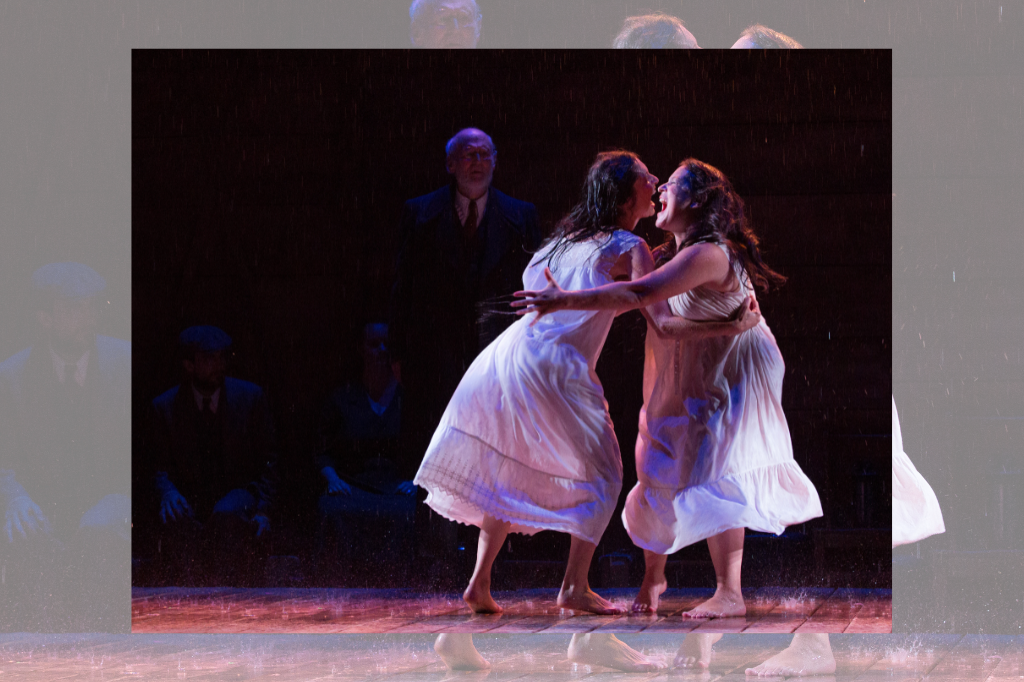REVIEW: Indecent at Studio 180/Mirvish
The cast is dead, but the show is beautifully, brilliantly alive.
“From Ashes, They Rise,” begins Paula Vogel’s 2017 play, Indecent, which raises a forgotten play’s story from the ashes of history.
In 1922, Sholem Asch’s God of Vengeance, a compassionate, sympathetic lesbian love story between a brothel owner’s daughter and a prostitute, transferred from the New York Yiddish theatre to an English-language Broadway production. A success in Europe in the 1910s and a hit in Yiddish downtown, the controversial play’s increased commercial exposure led to its undoing, as the entire cast was arrested on obscenity charges.
Vogel’s retelling of the play’s story shows us fleeting, tantalizing glimpses of the shuttered work in a play-within-a-play, staged by the show’s late cast with all the dignity of a repeated religious rite that is both methodically and relentlessly paced. We move in flashes, aided by the caption, “A Blink In Time,” from the writing of the play in 1906 and its mixed reception in Poland, to its premiere in Berlin in 1912, productions across Europe and cast changes, to its tragic implosion in New York. While we follow God of Vengeance, larger historical events are never far away, with growing European antisemitic violence forming a nauseating backdrop to American intolerance until they explode in different ways, and a shaken, post-Holocaust Asch incredulously watches the rise of the House Unamerican Activities Committee.
Mirvish and Studio 180’s searing and passionate production, directed with grace by Joel Greenberg and acted atop a simple backdrop of platform and chairs (set by Ken Mackenzie), ties together these stories about the transformative power of art and love, and boldly propels us forward as we look back. It is a must-see show about a show that could not be seen.
The Dead Troupe, which we are introduced to as pairs of Ingenue, Middle, and Elder, plays every role. The purposeful double-casting of the show impressively underscores its theme of diversity within a community, and gives the years and characters rushing by the undulating feeling of a fever dream. At the same time, it produces a spine-tingling sense of claustrophobia, as we watch actors trapped in a never-ending cycle of story, forced to reenact the events until somebody truly listens.
Jonathan Gould’s gradual disillusionment as the initially bold iconoclast Asch dovetails neatly with his later portrayal of another famous, world-weary playwright; his thousand-yard stare as he watches the disintegration of his homeland shows the black pit of emptiness at the heart of terror.
Tracy Michalidis always portrays the prostitute Manke in Asch’s play, but her handling of the role shows clear differentiation as the actress playing Manke shifts. Her arch smile as she plants pre-WWI era poison pills of German nationalism as actor Frieda Niemann in the initial production dissolves into a torrent of passionate tenderness when she becomes Deine performing the role in America. Deine’s real-life Jewish identity, along with her real-life love for her co-star playing Rifkele, Reina, gives her portrayal an edge of heightened tension and desire. Jessica Greenberg transforms from sweet, frustrated Reina, whose struggle to speak in unaccented English threatens her job and relationship, to her replacement: All-American Sweetheart Victoria, who brashly admits to taking the role of Rifkele to shock her parents and plays it all body, no soul.
Dov Mickelson embodies a well-meaning but destructive force in many forms, from the writer who refuses to read Asch’s “filth,” to the commercial producer who hacks the meaning–and the much-lauded “rain scene” between the two women—from the play to pander to Midtown, to the indignant rabbi that calls for its closure and the policeman who carries out the action. On the other hand, Nicholas Rice’s dismissive literato I.L. Peretz becomes the kindly, playful actor Rudolph Schildkraut, an old dog who can learn new tricks and champions the work.
The only member of our troupe that retains a singular identity is Lemml, the country bumpkin who is Asch’s play’s first and most passionate defender, and later its stage manager. Played with sweet charm by Matt Baram, he manages this play as well, our narrator and its heart. The embodiment of art’s ability to change perspectives and lives, he is enraptured from the get-go, visibly lighting up as new ideas enter his mind and he processes Rifkele and Manke’s heartfelt love.
Baram teeters on the edge of innocence for much of the play, a portrayal that invites us to see him as the world does: credulous, simple, here for our entertainment. While the rest of the characters only employ accents while speaking a language not their own–effective captions in both English and Yiddish indicate whether they are speaking English, Yiddish, or German–Lemml always has an accent, even in Yiddish, a choice of rustic dialect that pegs him as an eternal outsider. (Dialect coach Julia Lenardon has done a lot of good work with the wide range of accents).
Lemml’s initial clownishness, however, sets us up for the contrast of brutal heartbreak. Baram’s stellar performance becomes explosive as his unwavering support for the show transforms into increasing bitterness with the “land of opportunity” around him, and the lack of dignity he and the play are afforded.
In this vein, Indecent wrestles with representation of marginalized people in art, with some characters advocating for the right to depict Jews as fully human, with a complete range of positive and negative attributes. Other characters claim that showing Jews onstage as deeply flawed people lends ammunition to their enemies, who already believe and spread lies about the worst in them. Both voices come from within the Jewish community, critiquing the idea of that community as a monolith.
At the same time, the play gleefully, acidly takes on themes of personal and artistic assimilation, with characters making concession after concession about themselves or the play, only to ultimately still be rejected for an identity or script they now no longer recognize. “Call me Lou,” Lemml says; Deine, calling herself Dorothee, begs her lover Reina (now Ruth) to only speak English at home. We can see the difference between how the actors fluidly embody multiple characters on stage, and how stiffly they adjust to these pressures of change.
A vaudeville-inflected song declares (in Yiddish): “What can you do? This is America!” while the actors, dressed in Orthodox shtreimels (fur hats), pull off their traditional peyes (unshaven sidelocks of hair) to noises of pain and disgust.
Vogel calls the show “a play with music,” as the frequent songs stem not from the heightened emotion of characters, but represent songs that would be sung as part of daily life and work. Her own compositions mix with standards such as “I Still Have a Suitcase in Berlin” and “Bei Mir Bist Du Schoen,” ably evoking the period (not to mention bringing to mind the opening strains of Fiddler on the Roof). The onstage band, a clarinetist (John David Williams), violinist (Laetitia Francoz-Lévesque) and accordion player (Emilyn Stam), weave in and out of the action, creating silent characters in their own right. The musicians are captivating in their playfulness, underscoring a scene’s action, occasionally playing each other’s instruments, or just looking on.
The visual simplicity of the staging pulls our focus directly onto the actors: props designer Chynah Philadelphia’s weathered suitcases and Michelle Tracey’s monochromatic costumes of browns and blacks contrast with the brilliant pop of white in Rifkele and Malke’s nightgowns on a clandestine stroll in the rain. In a matter-of-fact yet arresting visual, ashes pour onto the stage from the actors’ sleeves, seemingly more than the clothing can hold. Even more breathtaking is the grim foreshadowing as Asch claps Lemml on the shoulder, only for a cloud of dust to rise into the air, and hang there, unacknowledged.
The visual motif of ash is given multiple meanings, from the wordplay of the playwright’s name (this all came from Asch), to curled wisps of memory carried away on the wind, to the metaphorical dust of an immigrant’s homeland that never fully washes away, to the horrifying reality of millions cremated in the Holocaust.
That great tragedy inescapably looms over the play, and scenes that deal simply and starkly with the brutality of the Holocaust are gutting. However, the lightness of the pace and the spotlight on moments of great joy result in an experience that is alternately and equally transcendent and heartbreaking.
Canada is not exempt from these stories of artistic suppression. Indecent unconsciously recalls our own shameful shutdown, when Toronto’s Yiddish theatre, the Standard, had its Communist-sympathizing production of Eight Men Speak closed by the government in 1933. The play’s repeated line, “It could never happen here,” feels as relevant as ever in the wake of increased antisemitic violence across North America and the world. At the same time, though, what Indecent promises is hope, through the trials of today and the dreams of tomorrow. It says that in the survival of art is the survival of humanity, and that our best quality is the astonishing ability to sing a song of gentle rain while the world burns to ash.
Indecent runs at the CAA Theatre until November 6. Tickets are available here.















Comments